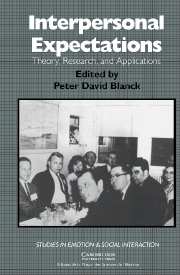Book contents
- Frontmatter
- Contents
- Preface
- List of contributors
- Introduction
- Part I Research on interpersonal expectations
- 3 Introduction to research on interpersonal expectations
- 4 Interpersonal expectations in the courtroom: Studying judges' and juries' behavior
- 5 Expectancies and the perpetuation of racial inequity
- 6 Pygmalion - 25 years after interpersonal expectations in the classroom
- 7 Interpersonal expectations in organizations
- 8 Interpersonal expectations and the maintenance of health
- 9 Precursors of interpersonal expectations: The vocal and physical attractiveness stereotypes
- 10 In search of a social fact: A commentary on the study of interpersonal expectations
- Part II Research on the mediation of interpersonal expectations through nonverbal behavior
- Part III The study of interpersonal expectations
- Author index
- Subject index
- Studies in Emotion and Social Interaction
7 - Interpersonal expectations in organizations
from Part I - Research on interpersonal expectations
Published online by Cambridge University Press: 23 December 2009
- Frontmatter
- Contents
- Preface
- List of contributors
- Introduction
- Part I Research on interpersonal expectations
- 3 Introduction to research on interpersonal expectations
- 4 Interpersonal expectations in the courtroom: Studying judges' and juries' behavior
- 5 Expectancies and the perpetuation of racial inequity
- 6 Pygmalion - 25 years after interpersonal expectations in the classroom
- 7 Interpersonal expectations in organizations
- 8 Interpersonal expectations and the maintenance of health
- 9 Precursors of interpersonal expectations: The vocal and physical attractiveness stereotypes
- 10 In search of a social fact: A commentary on the study of interpersonal expectations
- Part II Research on the mediation of interpersonal expectations through nonverbal behavior
- Part III The study of interpersonal expectations
- Author index
- Subject index
- Studies in Emotion and Social Interaction
Summary
From laboratory to classroom to factory
Summarizing a dozen or so studies of the experimenter effect in the American Scientist, Rosenthal (1963) wondered in print whether similar expectancy effects might occur among physicians, psychotherapists, employers, and teachers. He soon accepted Jacobson's challenge to conduct a teacher-expectation experiment in her school. Thus was launched the famous experiment that led to the publication of Pygmalion in the Classroom. Given what we have since learned about interpersonal expectancy effects in organizations, there can be no doubt that, had an industrial psychologist invited Rosenthal to his plant to replicate the experimenter effect in the real world of the shop floor, the landmark report would have been titled Pygmalion in the Factory. The Pygmalion effect would be widely known today as a management phenomenon, and organizational psychologists and consultants would be seeking ways to improve job performance by creating interpersonal expectancy effects. For subsequent research in organizations has abundantly confirmed Rosenthal's early hunch: Expectancy effects occur among adults in the workplace. This chapter presents a review of research on interpersonal expectancy effects in nonschool organizations and some ideas for practical applications designed to improve organizational effectiveness. Many of these proposals are relevant for schools, which are also organizations that employ adults. Generalizing interpersonal expectancy effects from teacher-pupil relations to principal-teacher interaction has not been duly considered by education experts.
Expectations in management
The notion that performance expectations play an important role in determining managerial effectiveness is not new, nor did it enter the management literature via the Pygmalion research.
- Type
- Chapter
- Information
- Interpersonal ExpectationsTheory, Research and Applications, pp. 154 - 178Publisher: Cambridge University PressPrint publication year: 1993
- 11
- Cited by



